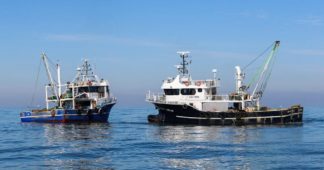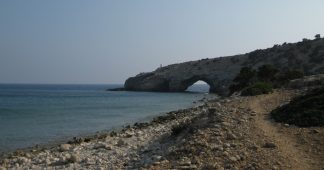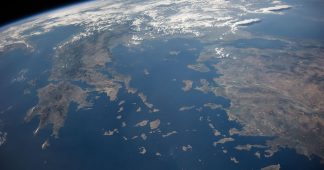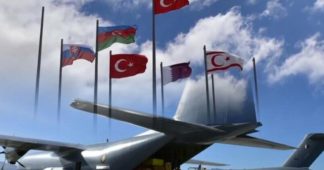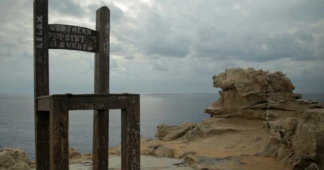By Prof. William Mallinson[i]
Harold Nicolson, in his book Diplomacy, laid great emphasis on the importance of precision. As the following shows, the falling standards of professional diplomacy in our fast electronic world seem to have been accompanied by an inability by diplomats –i.e. government PR people- to be precise.
During the Imia affair in 1996, Turkey laid claim to a large number of Greek islands, including Gavdos, off the southern coast of Crete. As part of my research for my forthcoming book on Greece’s and Cyprus’ geohistory, I decided to try and ascertain on what specific grounds Turkey claimed Gavdos, and to ask a selection of governments through their Athens embassies, what their position on Gavdos was.
I begin with Turkey. On 15 June 2006, I sent the following question to Ihan Saygili (who had been good enough to attend the launch of my book on Cyprus): “Does the government of the Republic of Turkey consider the isle of Gavdos (south of Crete) to be part of Greek territory? If not, why not?” Obtaining an answer proved to be like squeezing blood form a stone. Months passed, while Saygili awaited a response from Ankara. Then he was posted on, and a very friendly diplomat, Ergin Soner, put me in touch with one Baris Kalkavan, who asked me to send him a summary of my forthcoming book, since he did not see what it had to do with Gavdos! He also commented, inaccurately, that my published book was too pro-Greek (although I outlined the Turkish positions at length, having received answers from the Ambassador and the deputy lead of the Motherland Party). I waited until this January, and then telephoned Kalkavan. First he claimed that my question did not fit in with my book outline. When I contested this, he implied that this was not the real reason, but that the answer was too sensitive to be put on paper. I asked what this answer was, but he could not say.
The British Embassy was far more forthcoming and prompt, but nevertheless not overly precise. Tracy Gallagher replied: “HMG, like the rest of the international community [does this include Greece and Cyprus?] has not taken a formal position on any of the Aegean disputes (…). I understand that the UK issued a statement on Greek sovereignty over Gavdos in June 1996, which was reported by the BBC Greek Service at the time, but I have not seen the text. I have asked our research analysts to get hold of a copy.” I followed this up, but the Embassy was unable to locate the statement, adding however that on 12 June 1996, a senior Greek MFA official had thanked the Ambassador for a helpful statement on Greek sovereignty over Gavdos that the official said the BBC Greek Service had carried. Mrs Gallagher then suggested that I consult the BBC Greek service archives, a copy of which had been handed to the Greek Parliament.
At this point, I contacted the relevant officials in the Greek Foreign Ministry, to try and track down a statement that the British could not find, even though one of their officials had made it. They told me that the Greek Parliament could not locate it. However, they helpfully found an American Hellenic Institute statement, quoting the BBC report, which read as follows: “Britain does not have any doubts over the status of Gavdos Island, since Turkey does not provide any explanation regarding the relevant issue it brought forth at NATO and, as such, it proved that it was mistaken when it questioned the island’s sovereignty. Therefore, and according to common sense, the British government consider Gavdos to be a Greek island.”
In 1975, a British Embassy official in Ankara had written the following about the continental shelf dispute: “I was left with the impression that reference to the International Court [of Justice] was still something rather irrelevant and that the Turks hankered firmly, however unrealistically, for a bilateral solution. This is perhaps not surprising as they can presumably not have very much confidence in winning its case at the Court on its merits alone.”
I also asked the British Embassy in Athens whether they held this view. Mrs Gallagher’s reply was: “HMG has not taken a position.” Thus, Britain has not only not taken a position on the Aegean dispute, but neither on its own views.
The US government’s answer to my question on Gavdos was: “These are bilateral issues between Greece and Turkey. Our desire is for both sides to resolve this dispute bilaterally and peacefully.” Thus, it can be construed that the US think that Greece should discuss sovereignty of Gavdos with Turkey…
This deviates somewhat from what the State Department wrote to me in 2003: [“We recognize Greece’s border with Turkey”], but not all the territorial waters implications which Greece asserts. We have not taken a position on sovereignty over Imia/Kardak, in part because of the lack of an agreed maritime boundary.”
The Israeli response was embarrassing. William Anagnostaras tried to be as helpful as he could, but, after various telephone conversations (during which he told me that his new Ambassador was an Israeli Arab), his government was unable to state its view. This contrasts with the response I received five years ago, when the Embassy wrote to me: “Israel recognises Greece and Turkey in full terms and the existing borders of each country.” However, their ambassador at the time refused to answer a question about Greece’s maritime and air space limits. Clearly, Israel’s increasingly close formal co-operation with Turkey explains the reason for the lack of a satisfactory response: it covers training flights, manufacture and intelligence co-operation.
The French reply was courteous and rather similar to the British one: “The French Republic has not taken a formal position on the concurrent claims of Greece and Turkey relative to these two [Gavdos and Imia] islands.”
Like the Spanish, however, and unlike the British, the French Embassy stated that both parties should agree to resolve territorial differences at the International Court of Justice.
The German reply was mildly farcical. Herr Féaux de la Croix obliquely wrote: “Replying to your query dated 15 June I would refer you to freely accessible information.” When I asked him to explain what he meant, and to be more specific, he agreed that his reply really meant that his government declined to comment.
And so to the Russians. They were at one and the same time the friendliest and the most unyielding. Despite several telephone conversations with their press officer, and intimations that an answer would come, I am still waiting, some nine months later (at the time of writing). Perhaps the Russians do not wish to irritate Greece or Turkey, while the US does not mind needling Greece at various times.
The Italian response, from a Martin Brook, was only oral: “Italy adheres to international treaties.” Could they say otherwise? This is really slightly worrying for Greece, since back in 1996, the Italian Foreign Ministry put out a statement confirming that Italian rights in the area [Imia/Kardak] had been transferred to Greece in 1947. The fact that the Italian government did not even state this to me, let alone anything about Gavdos, should be disquieting for Greek diplomats.
The Irish government, like the Russian and Israeli ones, has still proven unable to give any response, even on the islet of Rockall, claimed by both Ireland and Britain. The British were, however, very clear that this islet is British.
The Iranians, after a little bit of chasing, finally told me on the telephone that “their government had no position”. The saddest response of all was from the Palestinians. Their diplomat told me that they could not get a response, because relations with their Foreign Ministry in Palestine were somewhat problematic…
From this maelstrom of words, I form two conclusions. First, the British Embassy performed better that any other, but still not precisely enough. Second, and perhaps worryingly for Greece, none of all the others I contacted had the courage to say that Gavdos is a Greek island. If such an allegedly minor issue cannot be clarified, then what is the future of St Diplomacy –not to mention Aghios Efstratios? The devil is in the detail. Oh, and is Sapienza (just off the coast of Methoni in Messinia) mentioned in the Treaty of Lausanne? If not, watch out, Athens!
Postscript: most embarrassingly of all, it appears that all the above diplomatic “respondents” are blissfully unaware that in 1999, a European Commission official wrote, in answer to a question from a member of the European Parliament, that the islands of Gavdos and Gavdopoula were under Greek sovereignty in accordance with the arrangements of the Treaty of London of 1913.
[i] Dr William Mallinson was a British diplomat, a Public Affairs Manager for ITT, and then obtained his doctorate at the London School of Economics.
Also read
Also read
The “Immortals”: From Chernobyl to Gavdos, Crete
We remind our readers that publication of articles on our site does not mean that we agree with what is written. Our policy is to publish anything which we consider of interest, so as to assist our readers in forming their opinions. Sometimes we even publish articles with which we totally disagree, since we believe it is important for our readers to be informed on as wide a spectrum of views as possible.
